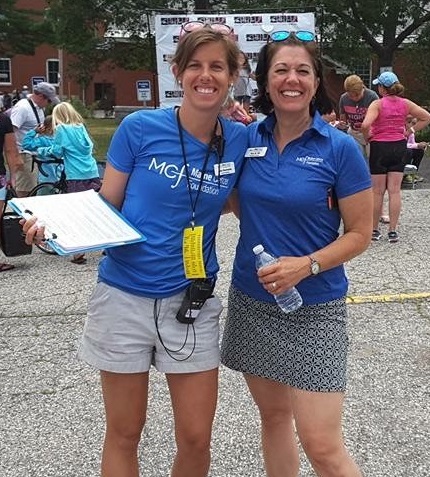In our Snapshots blog series, we turn to Maine Cancer Foundation constituents - from staff, board members and other volunteers, donors, grant recipients and beyond - to share important moments in their lives related to cancer. Our series will paint a broad stroke of the cancer landscape in the state, while narrowing the focus into the rare and intimate moments that bring us all together.
Snapshots #6 is the story of Maine Cancer Foundation’s Event Manager, Julia Bachelder. At 23 she found out she was a BRCA 2 carrier, she shares how she navigates through her journey.

“My grandfather died of breast cancer,” said Julia Bachelder, Maine Cancer Foundation’s Events Manager. Growing up, I knew he’d passed away from cancer, but it wasn’t until I was an adult that I learned he’d had breast cancer. Statistically, women are more likely to be diagnosed with breast cancer, but genetics play a large role in the diagnosis of men. “My dad asked my sister if we wanted him to be tested [for the breast cancer gene],” she reflected. “Some people want to know and some people don’t.” Julia and her sister asked her father to be tested, and they learned he was a carrier.
The breast cancer gene is scientifically referred to as BRCA 1 and BRCA 2; the Bachelder family carries the BRCA 2 gene. Julia and her sister now each had a 50% chance of being BRCA 2 carriers themselves. They decided to be tested; Julia has the gene, and her sister does not.
As a recent college graduate with the normal stressors of landing a job and finding an apartment, Julia shouldered the additional weight of carrying the BRCA 2 gene. She heard sobering statistics – high risks of breast and ovarian cancers – and heeded life-changing advice – consider prophylactic surgeries (mastectomy, oopherectomy, etc) – before settling into the new normal the BRCA gene required. “As a 23-year-old thinking about a family in the future, it felt incredibly overwhelming,” she shared.
Julia made the decision to face the options head-on. “I know I’m predisposed because of the gene, but as a result, there are steps I can take.” She follows a strict screening regimen and trusts in her decision to steer clear of preventative surgeries until the timing feels right. “I’m screened so frequently that if anything comes up, it will be caught early.”
Every six months she travels to Dana-Farber Cancer Institute in Boston for rotating mammograms and MRIs, coupled with a full clinical exam. She goes into the screenings with resolve and cautious optimism. She is 31 now, and nobody in her family has been diagnosed before 39. “I feel good going to the appointments because I’m in control.” Age recommendations for preventative surgeries start around 40. Removing ovaries greatly reduces breast cancer risk, but has a heavy consequence of early menopause. To Julia, a mastectomy is less daunting, but will be a huge consideration down the road.
When she first found out about the gene, nearly eight years ago, she didn’t want the news to define her life, and she’s stuck to her intention. “I’m not a cancer survivor. I’m healthy and I know what to look for. I’m going to do everything I can to prevent the disease and continue to follow my doctor’s recommendations for screening.” she said. “I feel fortunate that I found out before I was sick. It’s taken the power away from cancer for me. I don’t fear it anymore.”
While there are recommended early screening guidelines for carriers of the BRCA 1 and BRCA 2 genes, the standard screening guidelines for women of average risk have moved to a more flexible mammogram schedule: they should be offered screening mammograms every year or two starting at age 40 and start regular screening no later than age 50.
Breast cancer rates in Maine have been declining over the last decade because of strong statewide services. MCF is working to continue this positive trend as we have funded more than $460,000 in grants specifically focused on breast cancer, including Patient Navigators throughout the state who help patients understand their options and access screenings and obtain the best available care. We know that with early detection, cancer is far more treatment and beatable. Because of the changing guidelines, we encourage men and women to talk to their health care provider about their risks, and determine a screening protocol that is best for them.
Are you a Mainer with a story about cancer? We want to hear about it. E-mail ashley@mainecancer.org
#togetherwecan #challengecancer2020
For more information about BRCA genes, click here.
